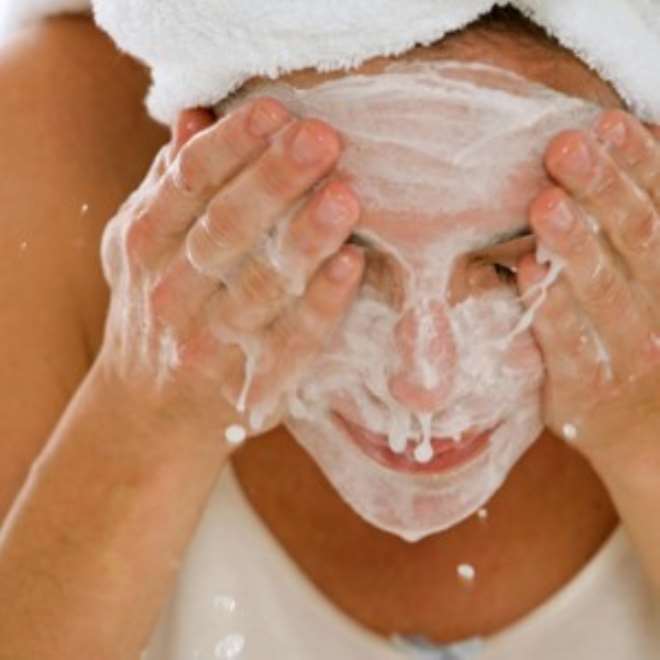The 10 Biggest Face-Washing Mistakes
Washing your face seems like the least complicated part of your beauty routine, right? Turns out that some common lathering habits can cause a whole list of skin woes, including dryness, irritation, oiliness, and breakouts. Read on to learn the 10 biggest face-washing mistakes—and how fixing them can alleviate nagging skin problems.
1. PICKING THE WRONG PRODUCT
The right cleanser should completely remove dirt, makeup, and grime, but not strip away too much of your skin's natural oils or healthy cells. Find one that does the job and is neither too gentle (you have to wash twice or scrub hard to cleanse thoroughly), nor too harsh (it makes your skin red and irritated or tight after drying).
2. OVERDOING IT
For the most part, washing once or twice a day is good protocol but any more can irritate skin, ironically leading to an overproduction of oil. If you didn't wear makeup, slather on sunscreen, or sweat much that day, skip the cleanser at night and try rinsing with slightly warm water. Giving your skin a break from the cycle of products is healthy from time to time.
3. USING THE WRONG WATER TEMPERATURE
Myth: hot water opens pores and cold water closes them. The reality is that pores don't have muscles to open and close. While hot water may feel good on your skin, it can screw with your skin's natural, protective oils and lead to over-drying or over production of sebum. Lukewarm water is the best bet to cleanse gently yet effectively.
4. EXFOLIATING TOO MUCH
Exfoliation is a healthy practice to slough off dead skin cells, but moderation is key. Cool it on grainy exfoliants (sugar scrubs and fruit acids are a gentler pick) and stick to exfoliating two to three times per week max. Use your fingers instead of a washcloth when exfoliating to prevent pulling and tugging of the skin
5. NOT RINSING WELL ENOUGH
Skimping on rinsing leads to residue build-up, which can clog pores and dry out skin. Rinse thoroughly, even when you're rushing in the morning or dog-tired at night. The jawline, hairline, and nose are the most commonly neglected spots, so show them some love!
6. USING IRRITATING INGREDIENTS
Do your face a favour and avoid irritating ingredients such as fragrances, colourants, and synthetic preservatives such as parabens. Sodium lauryl sulfate is another one to sidestep — it is commonly used as a surfactant to wash away debris, but is also a common cause of irritation and allergic reaction. Always read ingredient labels.
7. TOWEL RUBBING
Pat, don't rub. Rubbing can feel really good, but it tugs and pulls your skin, which puts your elastin at risk. And don't just grab the nearest hand towel, used or not. Friends don't let friends spread bacteria—especially all over a nice, clean face. Designate a clean, soft towel to blot your fresh face.
8. WAITING TO MOISTURIZE
To maximize absorption and help seal in moisture, apply moisturizers immediately after cleansing while skin is still damp. The same goes for serums and special treatment products. Waiting until your skin is completely dry will make it harder for the active ingredients to sink into your skin and can cause skin to feel greasy or tacky.
9. SPENDING A FORTUNE
Shelling out a small fortune for face wash may not be the most prudent purchase. Look for one with simple, natural ingredients and save your dough for products that will actually stay on your skin and offer longer-term benefits, like serums and moisturizers.
10. FEARING OILS
For a long time, oils were considered skin's pore-clogging nemesis, but the tide of opinion is changing. Experts say that all skin types, even oily and blemish-prone skin, can benefit from cleansing with oil. Oil dissolves oil, after all. The right oils will cleanse pores of dirt and bacteria, and help heal and balance skin. Look for cleansing oil products with natural, plant-based oils, or you can even try a high-quality almond oil, apricot kernel oil, grapeseed oil, or sunflower oil from the grocery store. (Coconut oil and olive oil may work for some, but have been known to cause problems for others). Simply massage the oil on your face and wipe with a soft washcloth dunked in warm water. Just be sure to wipe away the oil thoroughly to prevent residual build up and keep pores clear.
Source: womenshealthmag
Latest News
-
 "If You're For Me, I Am For You" - Cubana Chief P
"If You're For Me, I Am For You" - Cubana Chief P -
 "3 Days To Go" - Femi Adebayo Urges Fans To Get S
"3 Days To Go" - Femi Adebayo Urges Fans To Get S -
 "Stop Asking Me Questions About Speed Darlington"
"Stop Asking Me Questions About Speed Darlington" -
 "Benue Is The Most Underdeveloped State I've Ever
"Benue Is The Most Underdeveloped State I've Ever -
 Stan Alieke Urges Young Professionals To Take Lin
Stan Alieke Urges Young Professionals To Take Lin -
 Chizzy Alichi Teases Fans With Baby Reveal, Promot
Chizzy Alichi Teases Fans With Baby Reveal, Promot -
 "I'm Not Wearing Makeup From July 4th Till Decemb
"I'm Not Wearing Makeup From July 4th Till Decemb -
 "Stop The Challenge Of Mocking Kids With Down Syn
"Stop The Challenge Of Mocking Kids With Down Syn -
 Regina Daniels Celebrates Sons As They Mark Birthd
Regina Daniels Celebrates Sons As They Mark Birthd -
 Speed Darlington Threatens To Sue NAPTIP For Defam
Speed Darlington Threatens To Sue NAPTIP For Defam














